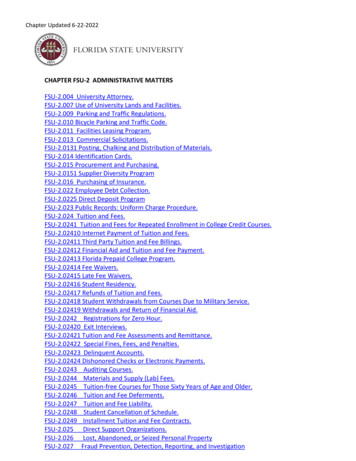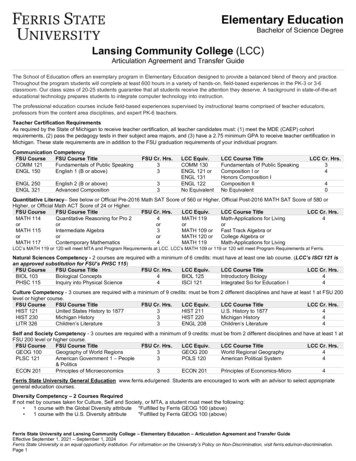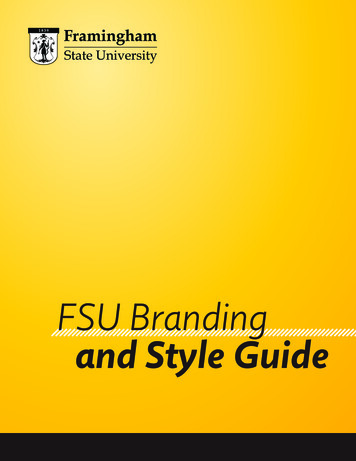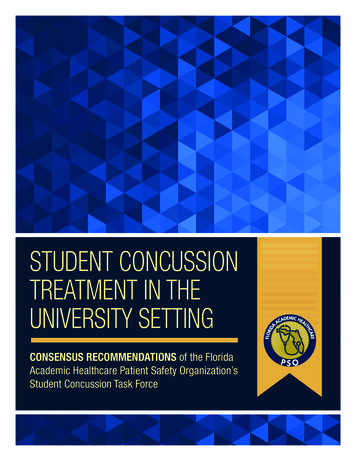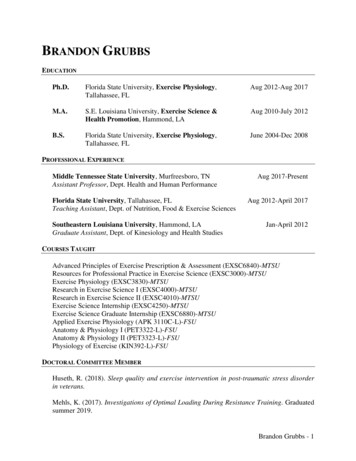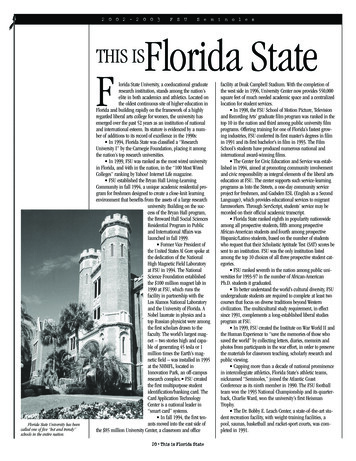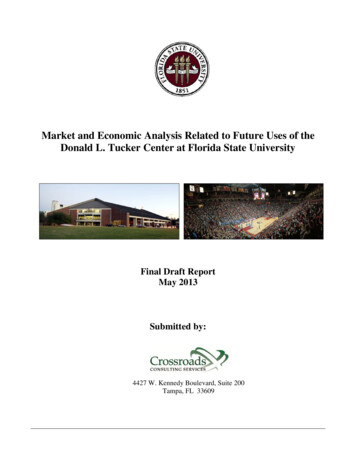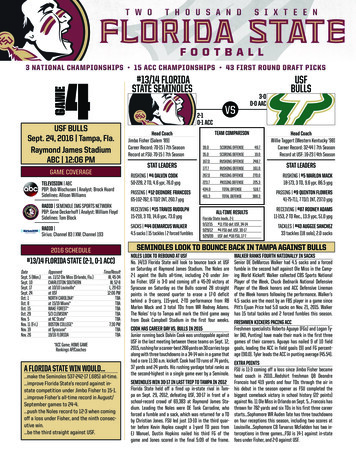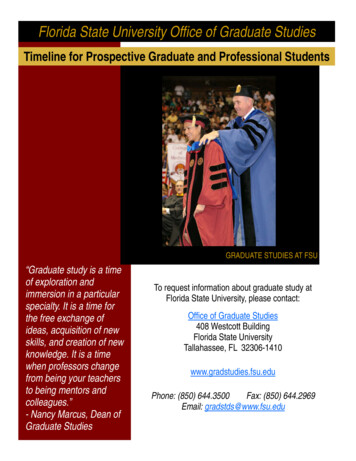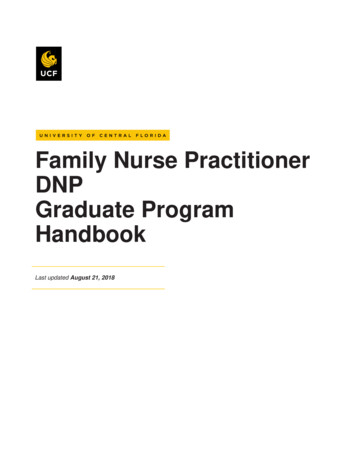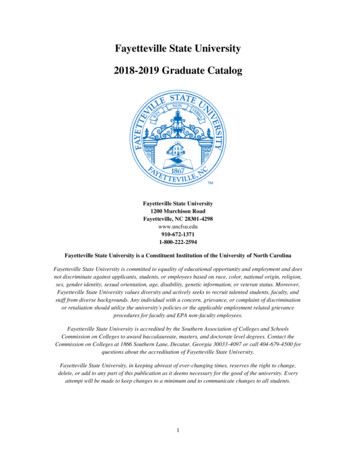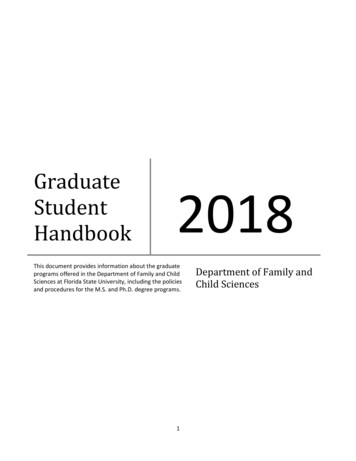
Transcription
GraduateStudentHandbook2018This document provides information about the graduateprograms offered in the Department of Family and ChildSciences at Florida State University, including the policiesand procedures for the M.S. and Ph.D. degree programs.1Department of Family andChild Sciences
STUDENT HANDBOOKGRADUATE PROGRAMSFAMILY AND CHILD SCIENCESFLORIDA STATE UNIVERSITY2018 - 2019ContentsINTRODUCTION .4Helpful Information . 4OVERVIEW OF GRADUATE PROGRAMS .5Master’s Program .5Doctoral Programs .5PROGRAM OF STUDY SUPERVISORY COMMITTEE .6Major Professor .6Establishing the Doctoral Program of Study Supervisory Committee .7GRADUATE CURRICULUM.7Master of Science Degree Program .7Ph.D. in Human Sciences, Human Development and Family Science Concentration with In-Flight Master’s .9Ph.D. in Human Sciences, Human Development and Family Science with In-Flight Master’s Curriculum . 9Ph.D. in Human Sciences, Concentration in Human Development and Family Science . 11Ph.D. in Human Sciences, Human Development and Family Science Curriculum . 11Ph.D. in Marriage and Family Therapy . 12Ph.D. in Marriage and Family Therapy Curriculum . 12Graduates of Non-COAMFTE Master’s Programs . 13Transferring Graduate Credit . 13SCHOLARLY ENGAGEMENT REQUIREMENT . 14DOCTORAL PORTFOLIO. 14DOCTORAL PRELIMINARY EXAMINATION . 19Preliminary Exam Eligibility Criteria . 19Procedure for Preliminary Examination . 20Preliminary Exam Questions. 222
Theory. 22Content . 22Methods . 22Preliminary Exam Grading Rubric . 23Dissertation Supervisory Committee. 25THESIS AND DISSERTATION POLICIES AND PROCEDURES . 25Master’s Degree: Thesis Option . 25Master’s Degree: Non-Thesis Special Project Option . 26Proposal for a Special Project . 26Final Paper for the Special Project . 27Earning the Master’s Degree in the In-Flight Ph.D. Program: Special Research Project . 28Master’s Degree: Application for Degree . 29Final Degree Clearance . 29Doctoral Dissertation. 29Language of the Dissertation and Thesis Policy . 30Doctoral Prospectus . 30Dissertation Research Project . 31Oral Defense Procedure . 32COMMENCEMENT . 33EVALUATION POLICIES AND PROCEDURES FOR DOCTORAL STUDENTS . 33OTHER IMPORTANT GRADUATE POLICIES. 33Provisional Graduate Student Policy . 33Anti-Discrimination and Grievance Polies . 33Criminal History Background Check Policy . 34Leave of Absence Policy . 35Dismissal from a Graduate Program 353
INTRODUCTIONWe welcome you to the Department of Family and Child Sciences, College of Human Sciences, atFlorida State University and wish you the best of success in your graduate career.This handbook has been prepared to provide information about the policies, procedures and degreerequirements of the various graduate programs in the Department of Family and Child Sciences of theCollege of Human Sciences. The information provided here adds to that which is covered in the FloridaState University General Bulletin, Graduate Edition. New graduate students are advised to read thishandbook in its entirety and to consult with their major professor or the Graduate Program Director ifany of the requirements described in it are unclear. All students should be familiar with Universityregulations and policies for graduate students as described in the Florida State University GeneralBulletin, Graduate Edition. Marriage and Family Therapy doctoral students should also refer to theProgram Handbook. To benefit from the information in this handbook, you must be prepared to takeresponsibility for your progress in the program. Do not assume that your advisor, other facultymembers, or staff will automatically remind you of every step that you need to take.Helpful InformationTo facilitate a smooth transition into your program here, we offer some links to important resources,helpful information on the FSU community and resources available, and a checklist of must-dos.Links to Important Resources: Graduate School Information BookletNew Graduate Student ChecklistInternational Students - The Center for Global Engagement (CGE) is the office assigned by theUniversity to provide comprehensive immigration services and advising to internationalstudents, scholars, faculty and staff. Also, CGE staff plans and conducts various workshops andprograms.FSU Basics - Fundamentals for the Well-Informed Graduate Student: Graduate Student Handbook - The Graduate Student Handbook contains informationconcerning resources at FSU, degree requirements, Electronic Thesis, Treatises, DissertationsGuidelines, and more.Graduate Bulletin - The Graduate Bulletin includes, but is not limited to, information on policies,degree requirements, graduate faculty, and academic programs.Course Search - Is it time to register for classes? Do you need to look up courses for nextsemester? Here is a helpful link detailing the process.myFSU - This is a centralized site that will enable you to register for classes, update yourpermanent address, and pay fees online.Campus Map - Lost? Here is a campus map to help you find your way.4
Must Dos: Health Insurance - New full time students (those taking at least nine graduate credit hours) andall international students entering FSU must show proof of health insurance. Select graduateassistants and fellows will be provided a health insurance subsidy towards the purchase of theuniversity sponsored health insurance plan. The subsidy will be disbursed by semester (fall;spring; summer). Information on the health subsidy and a summary of the health insuranceplans are available at dy-benefit.Residency - It is essential that domestic students coming to Florida from other states claimFlorida as their domicile and undertake the steps required to achieve in-state statusimmediately upon arrival. Additional information can be found y.cfm.OVERVIEW OF GRADUATE PROGRAMSMaster’s ProgramThe Department of Family and Child Sciences offers a Master’s (M.S.) degree program in Family andChild Sciences. Students may select a program of studies with either a thesis or special project option.A minimum of 30 semester hours is required for the thesis option, including 6 semester hours of thesiscredit. Students may elect a special project option and complete a minimum of 33 semester hours,including a 3-credit hour capstone Special Project (FAD 5970) experience. Students should selectcourses at the 5000 level; courses at the 6000 level may be selected with the approval of the instructorand major professor in advance of enrolling in the course. Be advised that courses designated as“advanced” assume some understanding of the field, and the content extends that of a baccalaureatedegree. The M.S. program prepares students for careers in higher education, government agencies,and agencies and businesses in the private sector. Many students go on to pursue doctoral degreeprograms, and others pursue careers in postsecondary education, public policy and other agencies andorganizations providing services to children and families.Doctoral ProgramsPrograms leading to the Doctor of Philosophy (Ph.D.) are offered in the Department with emphases inHuman Development and Family Science (HDFS) or Marriage and Family Therapy (MFT). Doctoralprograms are designed for students who wish to conduct research and teach in institutions of highereducation or work in government agencies or in the private sector as researchers and scholars.Graduates of these programs have secured careers in colleges and universities, child advocacyorganizations, cooperative extension services, marriage and family therapy agencies, and organizationsconducting policy research and program development and evaluation.Coursework counted toward a Master’s program prior to admission to a Doctoral Program in theDepartment cannot be counted toward meeting the requirements of the doctoral program. The5
doctoral programs have different minimum requirements for credit hours. More than the minimumrequirements are normally taken because the program of study is individually developed to assist eachstudent to meet his or her professional goals. In addition to a broad range of subject matter courses,students are provided a strong foundation in research methodology and statistics. Uniqueopportunities and departmental supports often are available, including teaching and researchassistantships, scholarships, fellowships, and other awards. Applications for scholarships, fellowships,and other awards can be obtained from the departmental and College website. Graduate students whoreceive teaching or research assistantships are evaluated annually. Based on these evaluations, futurefunding in these assignments is determined.Research is an essential component of graduate study in the Department of Family and Child Sciences.Department faculty members are actively involved in acquiring and carrying out funded and nonfunded research projects, and there are ample opportunities for students to gain research experienceand participate in various research teams. Funded projects make it possible for the Department toprovide additional assistantships to qualified students.PROGRAM OF STUDY SUPERVISORY COMMITTEEUpon acceptance into the program, all graduate students are assigned a temporary advisor at thebeginning of the academic year. During the first semester, students meet the faculty members in theDepartment and learn about their research as part of CHD 5617, Professional Development in Familyand Child Sciences. Afterwards, they are expected to identify a major professor.Terminal master’s students on the non-thesis, special project track are required to select a majorprofessor from within the department. Thesis-track Master’s students are required to have a majorprofessor and 2 committee members from within the department. All doctoral students must have amajor professor from within the department and at least 4 committee members, 3 from theDepartment and 1 from a College other than the College of Human Sciences. The outside memberserves as the University Representative. For MFT students, 1 of the required departmental membersmust be designated as MFT clinical faculty. The MFT faculty representative does not have to be thestudent’s major professor. All committee members must hold appropriate Graduate Faculty Status.Major ProfessorIn consultation with Department Chair or Graduate Program Director, students should select a majorprofessor as early as feasible, but no later than prior to registration for the third semester. The majorprofessor must have Graduate Faculty Status and competence in the student’s proposed area of studyor research. The designation as major professor must be mutually agreeable to the student, majorprofessor, and Department Chair.6
Establishing the Doctoral Program of Study Supervisory CommitteeThe major professor assists the student in identifying potential members of the Program of StudySupervisory Committee. It is the responsibility of the student to secure agreement from each memberand complete the necessary form designating the constituency of the Program of Study SupervisoryCommittee. This form is then submitted to the Department Chair and the Associate Dean for Researchand Graduate Studies for approval no later than prior to registration for the third semester. Studentswill not be allowed to register for their third semester if the Program of Study Supervisory Committeeform is not on file in the Office of the Associate Dean for Research and Graduate Studies in the Collegeof Human Sciences. Members of the Program of Study Supervisory Committee should be chosen fortheir potential contribution to the selection of appropriate content of study required to prepare thestudents for their professional goals.Supervisory Committees vary on how they prefer to approve the Program of Study. Some majorprofessors and committee members prefer a face-to-face meeting of all members and the student todiscuss the Program of Study and determine the fit between what is proposed and the student’sprofessional goals. Other committees prefer to provide approval without such a meeting. The majorprofessor is expected to provide leadership in the process.GRADUATE CURRICULUMMaster of Science Degree ProgramWithin the M.S. program, two options are available. The thesis option requires a minimum of 30semester hours for the degree, including completion of a thesis. The non-thesis option requires ofminimum of 33 semester hours, including completion of a capstone special project. Student shouldselect courses at the 5000 level; courses at the 6000 level may be selected with the approval of theinstructor and major professor in advance of enrolling in the course.M.S. in Family and Child Sciences Non-Thesis CurriculumRequired Core Courses:CHD 5266Advanced Child DevelopmentCHD 5617Professional Development in FCSFAD 5263Advanced Family StudiesCHD 6261Theories of Child DevelopmentORFAD 6436Theories of Family SciencesRequired Research Courses:CHD 5915Methods of ResearchFAD 5700Applied Research in Human SciencesFAD 5970Special Project710 credit hours3133311 credit hours443
Elective Courses Within FCS (examples):*CHD 5618Policy Development and Analysis in FCSCHD 5919Grant Writing in FCSCHD 5940Practicum in Child DevelopmentFAD 5906Directed Individual Study (topics vary)FAD 5256Parent and Child RelationsFAD 5261Families in CrisisFAD 5481College Teaching in Family SciencesFAD 5900Readings in FCS (topics vary)FAD 5912Supervised ResearchFAD 5942Supervised Teaching12 credit hours333-91-3332-331-31-3* Courses are selected with approval from the Advisory Committee in developing the program of study.TOTAL MINIMUM33Note: 21 credit hours must be letter graded coursesM.S. in Family and Child Sciences Thesis CurriculumRequired Core Courses:CHD 5266Advanced Child DevelopmentCHD 5617Professional Development in FCSFAD 5263Advanced Family StudiesCHD 6261Theories of Child DevelopmentORFAD 6436Theories of Family Sciences10 credit hours3133Required Research Courses:CHD 5915Methods of ResearchFAD 5700Applied Research in Human SciencesFAD 5971ThesisFAD 8976Thesis Defense14 credit hours4460Elective Courses Within FCS (examples):*CHD 5618Policy Development and Analysis in FCSCHD 5919Grant Writing in FCSCHD 5940Practicum in Child DevelopmentFAD 5906Directed Individual Study (topics vary)FAD 5256Parent and Child RelationsFAD 5261Families in CrisisFAD 5481College Teaching in Family SciencesFAD 5900Readings in FCS (topics vary)836 credit hours333-91-3332-33
FAD 5912FAD 5942Supervised ResearchSupervised Teaching1-31-3* Courses are selected with approval from the Advisory Committee in developing the program of study.TOTAL MINIMUM30Note: 18 credit hours must be letter graded coursesPh.D. in Human Sciences, Human Development and Family Science Concentration,with In-Flight Master’sThe Ph.D. in-flight degree program in Human Sciences with a concentration in Human Developmentand Family Science (HDFS) is a post-Baccalaureate doctoral program in which students earn (1) a M.S.in Family and Child Sciences and (2) a Ph.D. in Human Sciences with a concentration in HDFS. The M.S.portion of the degree program requires a minimum of 30 semester hours in coursework plus 3semester hours in special research project beyond the bachelor’s degree (minimum total 33).Students in the M.S. portion of this program should select courses at the 5000 level; courses at the6000 level may be selected with the approval of the instructor and major professor in advance ofenrolling in the course. Students must complete the M.S. within 3 years of enrollment in the program.The Ph.D. portion of the degree program requires a minimum of 36 semester hours in coursework plus24 semester hours in dissertation beyond the master’s degree. Courses that were not included on theM.S. POS but that were taken prior to a student being awarded the M.S., may be included on the Ph.D.POS and counted toward the degree. At least 21 semester hours of graduate courses are selectedwithin the Department, and no more than 6 credits of courses graded with S/U are allowed. Studentsare encouraged to include a cognate or minor area of study to reflect their professional goals.A Program of Study is developed in consultation with and approved by the Supervisory Committee;these must be filed within the first two semesters of enrollment in the program.Ph.D. in Human Sciences, Human Development and Family Science with In-flight Master’sCurriculumMS Curriculum (in-flight)Required Core CoursesCHD 5266FAD 5263CHD 5617CHD 626110 credit hoursAdvanced Child DevelopmentAdvanced Family StudiesProfessional Development in FCSTheories of Child DevelopmentRequired Research and StatisticsCHD5915FAD5700CHD/FAD5970331311 credit hoursMethods of ResearchApplied Research in Human SciencesSpecial Project9443
FCS Departmental Elective Courses (examples)CHD 5618CHD 5919FAD 5900FAD 590612 credit hoursPolicy Development and Analysis in FCSGrant Writing in FCSReadings in FCS (topics vary)Directed Individual Study (topics vary)3331-3TOTAL MINIMUM M.S. (includes special research project credits)Doctoral Curriculum (in-flight)Required Core CoursesHOE 6366FAD 5481CHD or FAD 5942FAD 6436FAD 6930r11-14 credit hoursResearch Best Practices in Human SciencesCollege Teaching in Family SciencesSupervised TeachingTheories of Family ScienceSpecial Topics in MFT: Family DiversityRequired Research and StatisticsFAD6935rFAD or CHD 5912FAD 6917FAD or CHD 8964FAD or CHD 6980FAD or CHD 8985Special Topics in FCS: Qualitative MethodsSupervised ResearchResearch Methods in FCSPreliminary Doctoral ExamDissertationDissertation Defense Examination31-33024015 credit hoursContent Analysis in Communication ResearchAdv. Topics in Analysis of Variance Apps.Multivariate Analysis ApplicationsCausal ModelingNonparametric Analysis ApplicationsSurvey Research MethodsApplied Survival AnalysisTime Series and Forecasting MethodsFCS Departmental Elective Courses (examples)CHD 5618CHD 5919FAD 5900FAD 5906FAD 6608FAD 691622-31-33331-33 credit hoursData Analytic Electives (examples)COM 5317EDF 5402EDF 5406EDF 5409EDF 5410SOW 6407STA 5179STA 585633Policy Development and Analysis in FCSGrant Writing in FCSReadings in FCS (topics vary)Directed Individual Study (topics vary)Effectiveness and Translation Research in MFTOutcome Research in MFTTOTAL MINIMUM POST M.S. (includes 24 credits for dissertation)10333333333 credit hours3331-33360
TOTAL MINIMUM M.S. / Ph.D.93Ph.D. in Human Sciences, Concentration in Human Development and Family ScienceThe Ph.D. degree program in Human Sciences with a concentration in HDFS requires a minimum of 56semester hours in coursework plus 24 semester hours in dissertation beyond the master’s degree(minimum total 80). At least 44 semester hours of graduate courses are selected within theDepartment, and no more than 9 credits of courses graded with S/U are allowed. Students areencouraged to include a cognate or minor area of study to reflect their professional goals. A Programof Study is developed in consultation with and approved by the Supervisory Committee; these must befiled within the first two semesters of enrollment in the program.Ph.D. in Human Sciences, Human Development and Family Science CurriculumRequired Core CoursesHOE 6366CHD 5617FAD 5481FAD 5942CHD 6261FAD 6436FAD 6930r15-18 credit hoursResearch Best Practices in Human SciencesProfessional Development in FCSCollege Teaching in Family SciencesSupervised TeachingTheories of Child DevelopmentTheories of Family ScienceSpecial Topics in MFT: Family DiversityRequired Research and StatisticsCHD 5915FAD 5700FAD 6935rFAD 5912rFAD 6917FAD 8964rFAD 6980FAD 8985r39-41 credit hoursMethods of ResearchApplied Research in Human SciencesSpecial Topics in FCS: Qualitative Methods in FCSSupervised ResearchResearch Methods in FCSPreliminary Doctoral ExamDissertationDissertation Defense ExaminationData Analytic Electives (examples)COM 5317EDF 5402EDF 5406EDF 5409EDF 5410SOW 6407STA 5179STA 58564431-33024012 credit hoursContent Analysis in Communication ResearchAdv. Topics in Analysis of Variance Apps.Multivariate Analysis ApplicationsCausal ModelingNonparametric Analysis ApplicationsSurvey Research MethodsApplied Survival AnalysisTime Series and Forecasting MethodsElective Courses (examples)CHD 5618CHD 5266CHD 5919FAD 5263FAD 5900FAD 5906212-31-33333333333314 credit hoursPolicy Development and Analysis in FCSAdvanced Child DevelopmentGrant Writing in FCSAdvanced Family StudiesReadings in FCS (topics vary)Directed Individual Study (topics vary)11333331-3
FAD 6930rFAD 6916Special Topics in MFT: Intervention ResearchOutcome Research in MFT33TOTAL MINIMUM (includes 24 credits for dissertation)80Ph.D. in Marriage and Family TherapyThe Ph.D. degree program in Marriage and Family Therapy (MFT) requires a minimum of 85 credithours of which 21 are clinical/supervision and 24 are dissertation. A Program of Study is developed inconsultation with and approved by the Supervisory Committee; these must be filed within the first twosemesters of enrollment in the program.Ph.D. in Marriage and Family Therapy CurriculumRequired Core CoursesHOE 6366CHD 5617FAD 5481FAD 5942FAD 6916FAD 6930rFAD 6930r15-18 credit hoursResearch Best Practices in Human SciencesProfessional Development in FCSCollege Teaching in Family SciencesSupervised TeachingOutcome Research in MFTSpecial Topics in MFT: Adv. MFT Theory and ApplicationSpecial Topics in MFT: Family DiversityRequired Research and StatisticsCHD 5915FAD 5700FAD 6935rFAD 6917FAD 6930rFAD 8964rFAD 6980rFAD 8985r41 credit hoursMethods of ResearchApplied Research in Human SciencesSpecial Topic in FCS: Qualitative Methods in FCSResearch Methods in FCSSpecial Topics in MFT: Intervention ResearchPreliminary Doctoral ExamDissertationDissertation Defense ExaminationResearch and Data Analytic Electives (examples)FAD 6608COM 5317EDF 5402EDF 5406EDF 5409EDF 5410SOW 6407STA 5179Effectiveness and Translation Research in MFTContent Analysis in Communication ResearchAdv. Topics in Analysis of Variance Apps.Multivariate Analysis ApplicationsCausal ModelingNonparametric Analysis ApplicationsSurvey Research MethodsApplied Survival AnalysisClinical Practice RequirementsFAD 6606FAD 6940rFAD 8944r4433302403 credit hours3333333321 credit hoursSupervision in MFTPracticum in MFTInternship in MFT3126Elective Courses (examples)CHD 5266CHD 5919212-31-33335 credit hoursAdvanced Child DevelopmentGrant Writing in FCS1233
FAD 6436FAD 5263FAD 5906rTheories of Family ScienceAdvanced Family StudiesDirected Individual Study (topics vary)TOTAL MINIMUM (includes 24 credits for dissertation)331-385Graduates of Non-COAMFTE Master’s ProgramsGraduates from MFT Master’s programs not accredited by the COAMFTE must complete theFoundational Curriculum. The MFT program director will review transcripts of students from nonaccredited programs to determine what additional coursework is required. Students can request tocount Master’s level courses toward the Foundational Curriculum requirements. To do so, studentsmust complete a course substitution form available from the MFT Program Director and attach syllabi.The MFT program director will review these materials and determine which courses may be countedtoward the Foundational Curriculum. No Foundational Curriculum course will be waived. Students willthen prepare an initial Program of Study by the middle of their first semester that includes theadditional required courses which may not be counted toward meeting the required minimum credithours for the doctoral degree. Students must complete the Foundational Curriculum before taking thepreliminary doctoral examination.Transferring Graduate CreditIn cases where a graduate student is transferring to our graduate program, the student may request totransfer some graduate credit. Specifically, if graduate courses taken from another institution were notcounted toward a previous degree and the student earned a “B” or better, the student may requestcourses to be posted to his/her FSU transcript. The college limit on transfer credits is 6 hours. Thesecourses will not count toward fulfilling minimum credit hour requirements or count in their GPAcalculation. If the student earned a master’s degree, the university requires the doctoral student tosatisfy the scholarly engagement requirement, pass the preliminary exam, take a minimum of 24dissertation hours, and pass the dissertation defense. In addition, the college requ
programs. FSU Basics - Fundamentals for the Well-Informed Graduate Student: Graduate Student Handbook - The Graduate Student Handbook contains information concerning resources at FSU, degree requirements, Electronic Thesis, Treatises, Dissertations Guidelines, and more.
